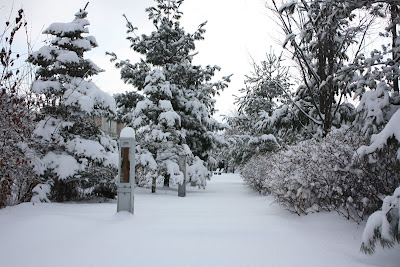Grand Bazaar today. I'd like to say we didn't spend our entire day shopping, but, um... We started off with great intentions, but we just seemed to get absorbed by the market, a sprawling labyrinth of vaulted ceilings and archways and water fountains, and nonsensical signs like "New Market (1571)". Shopping there, in our further defence, is not like shopping down your local Tesco. It's an entire way of being, you have to adapt your eyes and your soul; you have to learn that you don't just buy a bowl, you chat to the owner, you discuss your home country, you might even have a cup of tea together, and then you will mutually decide on an agreeable amount to be paid for a little work of art. And, sometimes, you will say goodbye with kisses on both cheeks. I think that we're very lucky, being here at this time of year - the market, which was described in an article I read as being an incredible test of mental and physical strength, and having between 250,000 and 400,000 visitors per day in summer, in winter is almost devoid of tourists and is instead full of headscarved grannies buying tea and linen, and men bearing beautiful silver and glass teacups on engraved trays to the shopkeepers, who drink and smoke together on little stools in front of their shops, and return the cups to the next passing tea-man.
We wander about the streets looking at backgammon boards and pottery. Some streets are completely filled with sellers of intricately metal-worked lamps, which cast a surreal glow over the brick walls and tiled arches. Some streets are named for their artisans, so Jeweller's Street, which runs through the centre, a wide and built-up street with full-on jewellery shops displaying endless gold bracelets, is easily avoided by Robyn and me, who want handmade masterpieces from countryside cottages. A few shopkeepers try to tempt us with rubber jackets and Gucci bags, but the majority of stalls are filled with beautiful ceramics, kilims, antique printing blocks, evil eye pendants, tapestries... I start to wonder if I've brought a big enough suitcase.
We stumble into a pretty, open courtyard with a fountain and trees and a hole-in-the-wall teashop, where we buy two teas served in vase-like glasses. We drink them standing in a corner, watching the endless tea-men scurrying off to all the stalls, and pay 20p each. It might be the best glass of tea I've ever had.

We spend hours and hours in the market, people-watching mostly, in between coffees at tiny cafes that are part antique shop, part art gallery with antique waistcoats serving as chair covers.

I imagine we actually see a very small part of this sprawling market, which apparently spreads its vaulted wings over 5000 shops and 60 lanes, and has sat here in the centre of Istanbul since 1461.

I imagine we actually see a very small part of this sprawling market, which apparently spreads its vaulted wings over 5000 shops and 60 lanes, and has sat here in the centre of Istanbul since 1461.
Eventually we head outside again - the weather has changed fom snow and rain to flashes of sunlight from behind low clouds - only to delve into another market - the Egyptian Spice Market - also covered, but spread over just two lanes filled with the strong scents of henna, saffron and tea, paprika and curry, chilli and oregano. It's known as the Egyptian Market because when it was built in the 17th century, most of the spices traded and stored here were imported via Egypt. We have a late lunch of cheese, cucumber and olives and have to fight off the stray cats that are drawn towards us by the enormous pile of meat that came with our "vegetarian" platter. Be not deceived by the "stray" description though - it's not really an apt description of the fat, sleek cats that roam this city.




















































